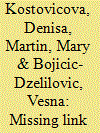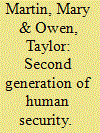| Srl | Item |
| 1 |
ID:
078439


|
|
|
| 2 |
ID:
120002


|
|
|
|
|
| Publication |
2013.
|
| Summary/Abstract |
The concept of human security continues to defy definitional clarity at the same time as it is being embraced by policymakers. This article proposes a practice-grounded approach that focuses on investigative method as a way of linking conceptual understanding of human security to the research process. Probing the 'actorness' of individuals in volatile contexts, a study of insecurity in Kosovo shows how dialogue can be applied as a research tool to access and assess human security in the field. Dialogue permits recognition of the power of the researched in the construction of knowledge of security, and accordingly reflects the conceptual shift represented by human security from states to communities and individuals. In the Kosovo study, dialogic research captured individual agency in the face of pervasive insecurity and revealed contradictory effects of such agency. This led to the formulation of the idea of the multidirectional security marker as a means of understanding experiences of insecurity in relation to strategies to combat it. Three such markers - self-reliance, informality and community solidarity - emerged and are analysed in the case of Kosovo. Simultaneously denoting restrictions on people's security and possibilities for overcoming those very same limitations, the markers express the agential dimension of human security and show how agency and security interact.
|
|
|
|
|
|
|
|
|
|
|
|
|
|
|
|
| 3 |
ID:
095126


|
|
|
|
|
| Publication |
2010.
|
| Summary/Abstract |
The concept of human security, while much contested in both academic and policy debates, and highly fragmented across different meanings and forms of implementation, offers a potential locus around which global security discourse might converge, particularly in light of current shifts in US security thinking. However, key pioneers of human security, such as the United Nations and Canada, appear to be losing their enthusiasm for the concept, just at the moment when others such as the European Union, are advancing a human security agenda. This article examines the divergence of human security narratives between the UN and the EU. It argues that the UN's use of the concept ran aground owing to a triple problematic of lack of clarity, confusion between previously distinct policy streams on human rights and human development and conceptual overstretch. After assessing the EU experience with the concept to date, the article argues that future use of human security will require greater focus on how it deepens ideas of individual security, rather than treating it as an agenda for broadening security. As well as a need to project clarity on the conceptual definition of human security, there is also a need to associate human security with greater clarity of intent. If successful, this would contribute to establishing second generation human security as a new policy paradigm.
|
|
|
|
|
|
|
|
|
|
|
|
|
|
|
|